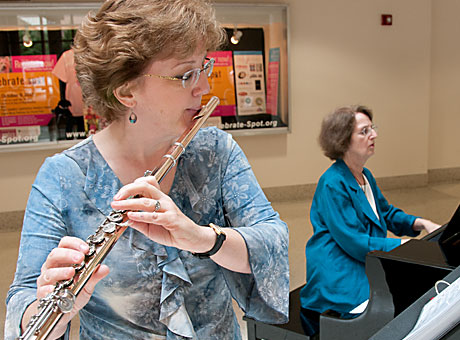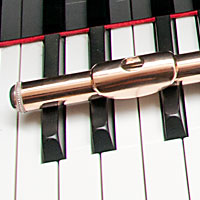



“Music is therapy. It is a communication far more powerful than words, far more immediate, far more efficient.”
—Yehudi Menuhin, violinist and conductor
People visiting the Center for Advanced Medicine (CAM) on the campus of Washington University School of Medicine might be surprised to hear live music as they arrive at the facility’s bustling lobby. But for the past decade, the CAM has offered not only patient care at nearly two dozen treatment centers and the Alvin J. Siteman Cancer Center, but also a tradition of impromptu entertainment.
Nancy Donnelly, a lab coordinator/administrative assistant in the Neurofibromatosis Center within the Department of Neurology, is among a group of musicians who regularly share their musical talents with people coming and going in the CAM.
Donnelly first spotted the piano in the CAM lobby during a lunchtime walk shortly after she began working at the School of Medicine in 2008.
“Although I don’t play the piano, I was determined to share my flute music and use it as a healing tool or to just lift the spirits of those going through medical procedures or chemotherapy and their family members. Each time I began playing my flute near the piano, fellow musicians would come over, introduce themselves, then sit down at the piano and join me.”
A flautist for 38 years, Donnelly earned a bachelor’s degree in music therapy from the New School of Social Research in New York, N.Y. While studying music therapy, she participated in a research project, Music and Memory, under renowned neurologist Oliver Sacks, MD, at the Albert Einstein College of Medicine.
Witnessing the powerful effect that music had on people with Alzheimer’s and other diseases during the study left a strong impression on Donnelly as to the link between music and healing.
That link is also obvious to others. Kylie Latham, a navigator/volunteer program specialist at the Siteman Cancer Center, notes that people respond very positively to both unplanned and planned musical events at CAM, which she schedules.
In addition to the spur-of-the-moment stylings of patients and caregivers and the regular performances of musicians like Nancy Donnelly, Latham has encouraged students from the Department of Music in the College of Arts & Sciences on the Danforth Campus to perform. And while the CAM showcases a great diversity of musical styles, Latham notes, the high level of talent tends to be uniform.
"There is a visible change in the atmosphere when people start playing," says Latham. "I even know of some staff who schedule their lunchtimes to coincide with particular music events."
That's gratifying to Donnelly, who moved to St. Louis and took up residence in the city’s Central West End (CWE) after working as a senior engineering assistant at Underwriters Laboratories Inc. for 17 years in Long Island, Toronto and Chicago. She and her fiance, Rick, continue to live in the CWE; he is, says Donnelly, "the biggest supporter of my music."
In addition to her current position at the university (she formerly worked in the university's School of Engineering & Applied Science), Donnelly teaches flute lessons and performs regularly at public venues around the city, such as the Sheldon Concert Hall, and at private events. Local music legends with whom she has worked include jazz singer Mae Wheeler, Cathedral Basilica former director and organist John Romeri, harpist Terri Langerak and a multitude of others.

Donnelly plays at the CAM a few days each week during her lunch break with three pianists: professionals Mary Sutherland and Pauline Stark, and Deb Henry, a cancer survivor who uses her music to minister to patients going through cancer treatments.
“I never know who will be touched by the music,” says Donnelly. “Last week, I played a popular tune and people started to applaud over the balcony and yell out ‘Thank you! That's my favorite song.’ Another person came by in a wheelchair to say he had heard the music from the 7th floor and followed it down to the lobby just to say 'thank you.'”
For Donnelly, lunchtime has become a “boost of humanity.”
“I'm always amazed when people walk into the CAM and come right over to the piano,” says Donnelly. “Sometimes they’ll ask for music to calm them down before an appointment; in one instance, a family that had just lost a loved one requested “Amazing Grace” be played. They are so emotionally moved and appreciative of the music that it makes me truly feel for what they are going through.”
To learn more about ongoing performances at the CAM, or to schedule piano time, please contact Kylie Latham at klatham@dom.wustl.edu or (314) 747-9095.